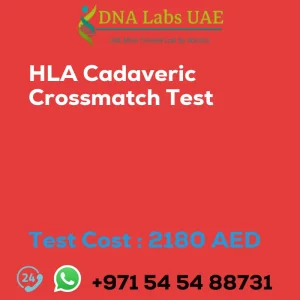CHIMERISM SPLIT CELL ANALYSIS – T Cell CD3 Test
Test Name: CHIMERISM SPLIT CELL ANALYSIS – T Cell CD3 Test
Components: T Cell (CD3) Test
Price: 1870.0 AED
Sample Condition: 4 ml (2 ml min.) whole blood / Bone marrow in 1 Lavender Top (EDTA) tube. Ship refrigerated. DO NOT FREEZE. Indicate Date of Bone Marrow Transplant.
Report Delivery: Sample Daily by 11 am; Report 7 Working days
Method: PCR, STR / Fragment Analysis
Test Type: Transplantation Pathology
Doctor: Hematologist
Test Department: Pre Test Information
Indicate Date of Bone Marrow Transplant.
Test Details:
The T Cell (CD3) test is a specific analysis performed as part of chimerism split cell analysis. Chimerism refers to the presence of two or more populations of cells with different genetic compositions within an individual. Split cell analysis is a technique used to determine the proportion of donor and recipient cells in post-transplant patients.
In the context of chimerism split cell analysis, the T Cell (CD3) test focuses on T cells, which are a type of white blood cell involved in the immune response. CD3 is a protein marker found on the surface of T cells.
During the test, a sample of blood or bone marrow is collected from the transplant recipient. The cells in the sample are then stained with fluorescently labeled antibodies that specifically bind to CD3 molecules on T cells. This staining allows for the identification and isolation of T cells from the sample.
After isolation, the T cells are further analyzed to determine their genetic composition. This is done by comparing the DNA or genetic markers of the T cells with those of the donor and recipient. By examining the genetic differences, the proportion of donor and recipient T cells can be determined.
The T Cell (CD3) test is crucial in chimerism split cell analysis as it provides specific information about the proportion of T cells derived from the donor and recipient. This information helps monitor the success of transplantation and detect any potential graft rejection or relapse of the underlying condition.
| Test Name | CHIMERISM SPLIT CELL ANALYSIS – T Cell CD3 Test |
|---|---|
| Components | |
| Price | 1870.0 AED |
| Sample Condition | 4 ml (2 ml min.) whole blood \/ Bone marrow in 1 Lavender Top (EDTA) tube. Ship refrigerated. DO NOT FREEZE. Indicate Date of Bone MarrowTransplant. |
| Report Delivery | Sample Daily by 11 am; Report 7 Working days |
| Method | PCR, STR / Fragment Analysis |
| Test type | Transplantation Pathology |
| Doctor | Hematologist |
| Test Department: | |
| Pre Test Information | Indicate Date of Bone Marrow Transplant. |
| Test Details |
The T Cell (CD3) test is a specific analysis performed as part of chimerism split cell analysis. Chimerism refers to the presence of two or more populations of cells with different genetic compositions within an individual. Split cell analysis is a technique used to determine the proportion of donor and recipient cells in post-transplant patients. In the context of chimerism split cell analysis, the T Cell (CD3) test focuses on T cells, which are a type of white blood cell involved in the immune response. CD3 is a protein marker found on the surface of T cells. During the test, a sample of blood or bone marrow is collected from the transplant recipient. The cells in the sample are then stained with fluorescently labeled antibodies that specifically bind to CD3 molecules on T cells. This staining allows for the identification and isolation of T cells from the sample. After isolation, the T cells are further analyzed to determine their genetic composition. This is done by comparing the DNA or genetic markers of the T cells with those of the donor and recipient. By examining the genetic differences, the proportion of donor and recipient T cells can be determined. The T Cell (CD3) test is crucial in chimerism split cell analysis as it provides specific information about the proportion of T cells derived from the donor and recipient. This information helps monitor the success of transplantation and detect any potential graft rejection or relapse of the underlying condition. |








